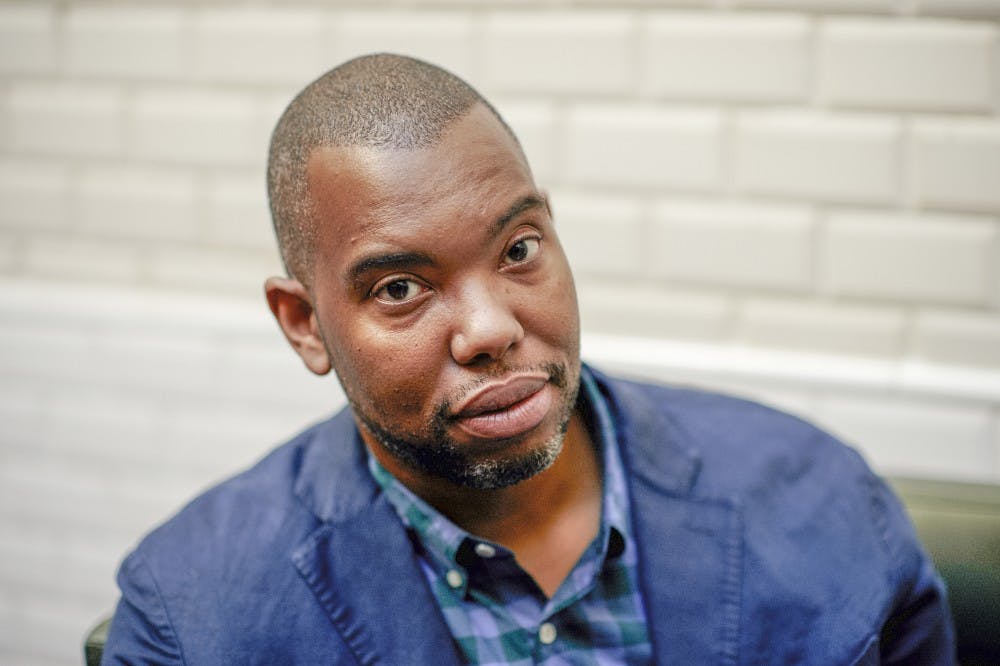Ta-Nehisi Coates, acclaimed writer and Baltimore native, spoke to a packed Shriver Hall about the concept of black criminality and the process of writing his latest book, Between the World and Me, which won the National Book Award for Nonfiction on Nov. 18.
Coates previously came to Hopkins in April as the first speaker of the JHU Forums on Race in America that were started in the aftermath of the death of Freddie Gray and the ensuing unrest in Baltimore. Over the summer incoming students were expected to read Coates’ first memoir, The Beautiful Struggle, which follows his childhood in Baltimore as part of a black “conscious” family.
Coates was introduced by Dean of Student Life Terry Martinez and Freshman Class President Noh Mebrahtu.
When Coates stepped up to the podium, the audience gave him a standing ovation. Coates began his talk by discussing the ways in which The Fire Next Time by James Baldwin, a national bestseller that helped spur the Civil Rights Movement, influenced his writing of Between the World and Me.
Coates compared his experience of reading the novel when he was young to rereading it after his son was born. He said the reading it a second time gave him new perspectives on what it means to be a black man and father and ultimately gave him the inspiration to begin writing Between the World and Me.
“I very much felt it,” Coates said. “I now had the vocabulary to understand exactly what he was saying.”
Coates weaved the theme of “criminality” throughout his talk, saying that American society tends to create “boxes” of criminality around black people more readily than those of other races; and that black people are more often in violation of the law because the laws were written to specifically target them.
“It has been like a working theory in my journalism and most of my work — How do you get that box? How’s that happen in the first place? How is it that Prince Jones [Coates’ friend who was controversially killed by a police officer]... nothing that his mother did, nothing that he actually did, none of that is considered?” Coates said. “He’s automatically thrown into the box if we label people with a predisposition towards criminality.”
Coates explained that even United States President Barack Obama is subject to such labeling. Coates denounced the Birther movement, which claimed that Obama was not born in the U.S., saying that it fits into his framework of black criminality.
“[It] is to say, he illegally occupies the White House, that he is in fact a criminal; This is a criminal offense. That’s the entire logic of it, and it’s so effective,” he said.
Republican presidential candidate Donald Trump was a major proponent of the Birther movement.
“It’s so widely believed that we’ve seen throughout the presidency polls, which suggested that as much as half of the majority of one of our major political parties [the Republican party] believes this to be true,” he said.
Coates also discussed the history of racism in America, focusing on what he called the enslavement of black bodies. He said that throughout its history, the U.S. has made conscious choices regarding its treatment of black people, including in the Constitution.
“If you go and read your Constitution, you will know that there is a fugitive slave clause,” Coates said. “Anyone who assisted an enslaved black person in attempting to basically acquire the same rights that people we call white in this country have, that person is branded a criminal.”
He noted that what the most revered figures of the Civil Rights and abolitionist movements did was illegal.
“Don’t forget how Harriet Tubman was regarded in her time,” Coates said. “Frederick Douglass stands up before the abolitionists and says ‘It appears that I have stolen my body.’ He was not engaging in hyperbole, that was really what he was accused of at this time. He was regarded as a criminal for acting like ordinary white people act every day.”
Bringing that concept into the 21st century, Coates said during the question and answer session that he would recommend that buildings named after racists or slave owners not be renamed but rather have plaques affixed to them detailing the crimes that the people committed against black people.
For Coates, the body is precious, and for centuries slave owners stole the fundamental right to control one’s own body from enslaved black people.
In the Jim Crow era in the South, lynchings achieved the same end.
“We subject that group of [black] people to a centuries long terrorist campaign,” he said. “That is what lynching is, it’s terrorism. It’s the attempt to affect political change by killing you.”
Coates said echoes of this thievery of control over one’s body still resonate in today’s society.
He concluded by discussing the link between the foundations of American democracy and the exploitation of black people.
“You can’t divide the making and construction of this American democracy from the plundering of black folks,” he said. “The way we made it okay was the presumption of criminality for black people.”





